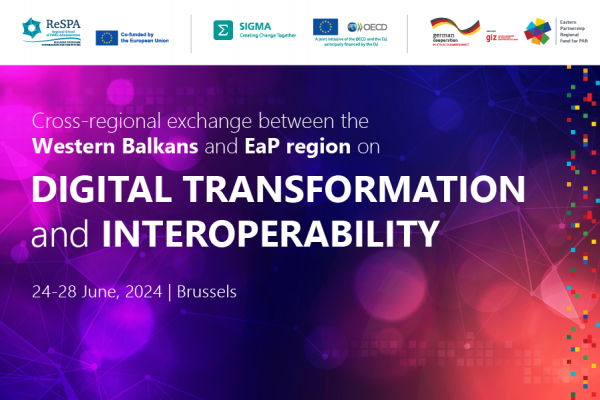
SIGMA, GIZ, and ReSPA Advance Interoperability and Digital Transformation for Western Balkans and Eastern Partnership Through Brussels Learning Week
24-27 June 2024, Brussels, Belgium
Interoperability and digital transformation experts from the Western Balkans and Eastern Partnerships gathered in Brussels for a week-long exchange and learning event. Forty senior public officials shared best practices and explored digitalisation and interoperability in public services at national, regional, and international levels.
The goal was to connect experts from both regions for exchange and learning, enhancing digital public services and interoperability, and promoting digital cohesion across the EU and its neighboring regions.
Experts from the European Commission and EU Member States shared insights on EU standards, including the European Interoperability Framework, eID, eIDAS 2.0, “once-only” data registration, e-wallet and trust services:
DAY 1: Delving into the EU Interoperability and “Once-Only” Principle
Stefan DEDOVIĆ (KU Leuven/University of Tartu) guided participants through EU interoperability history, Digital Single Market goals, and key regulations like eIDAS and GDPR for cross-border public services.
Maria LEEK (European Commission) presented the Interoperable Europe Act, discussing its impact on the Western Balkans and Eastern Partnership regions and their readiness to meet new standards.
Afternoon sessions focused on the "Once-Only" principle to reduce administrative burdens by reusing citizen and business information across public administrations. Joep CROMPVOETS (KU Leuven) explored cross-border interoperability and data spaces, highlighting the importance of assessments to bridge gaps in digital services. Participants discussed challenges, opportunities, and practical solutions to enhance regional digital public services and interoperability.
DAY 2: Exploring eIDAS 2.0 and Digital Identity Solutions for WB and EaP
Laura KASK (Proud Engineers, Estonia) discussed eIDAS 2.0's challenges and opportunities, while Stephanie De Bruyne (CEO, Belgian Mobile ID-itsme) showcased itsme, a secure digital identity solution used for seamless access to online services across various sectors.
Kask and Almir BADNJEVIĆ (IDDEEA.BIH) reviewed eIDAS 2.0 provisions, highlighting Bosnia and Herzegovina's eID journey and e-Wallet implementation.
Experts explored eIDAS 2.0's significance for non-EU countries, strategies for national adaptation, and preconditions for mutual recognition of e-signatures. Danilo RAČIĆ (Ministry of Public Administration, Montenegro) shared regional efforts on mutual trust services recognition among Montenegro, Serbia, and North Macedonia.
Participants worked in groups to discuss adapting eIDAS 2.0 to national contexts and ensuring mutual recognition of e-signatures, presenting recommendations for future cooperation between the Western Balkans, Eastern Partnership, and the EU.
DAY 3: Focusing on Digital Identity, AI, and Data Management
In the Marie Belpaire Building, experts discussed digital identity, AI, and data management: Prof. Erik MANNENS (imec IDLab, University of Antwerp) highlighted AI advancements and their impact on digital public services, while Raf BUYLE (ATHUMI, Government of Flanders) introduced the OSLO methodology for standardizing data interoperability.
Apostolos APLADAS (European Commission) discussed EU efforts in mutual e-signature recognition to boost digital trust, with insights from Ludmyla RABCHYNSKA (Ukraine) on cross-border digital transactions. Viivi LAHTEENOJA (MyData, Finland) examined data ownership frameworks empowering citizens.
The meeting fostered discussions on advancing digital interoperability, trust services, and citizen empowerment, promoting collaboration across the EU and both regions.
DAY 4: The SEMIC 2024 Conference provided a comprehensive overview of the latest developments in the EU Interoperability regulatory framework
On the fourth day, participants attended SEMIC 2024, an international conference titled "Interoperable Europe: From Vision to Reality," co-organized by the European Commission, the Belgian Presidency of the Council of the European Union, and Digital Flanders. The conference focused on advancing semantic interoperability across interconnected e-Government systems, marking the beginning of a journey towards a unified European administration in line with the Interoperable Europe Act.
High-level panels explored the vision and practical implementation of the Interoperable Europe Act, alongside numerous sessions dedicated to next-generation digital governance. Topics included AI implementation, privacy regulations, data management, and strategies to enhance European interoperability. Discussions also covered solutions for interoperability within and between data spaces and innovations in public services. This provided participants with a comprehensive update on the latest developments in the EU regulatory framework and operational practices in this field.
Participants at the SEMIC EXPO eagerly explored a diverse array of exhibits showcasing the latest innovations in digital interoperability and governance. The event featured key initiatives from the European Commission, including portals and academies focused on enhancing public sector technology and data spaces. Private sector and start-up companies also joined, presenting solutions and technologies. This bustling environment provided a rich networking opportunity, learning about new technologies, and exchanging best practices in digital transformation.
The 2030 Digital Decade policy programme sets out Europe’s ambition to make 100% of key public services accessible online, ensure everyone can access their medical records, and provide a secure EU-wide electronic ID. Increasing interoperability is crucial, enabling seamless cross-border data exchange as recommended by the European Interoperability Framework. The learning week on digitalization and interoperability aimed to align both regions closer to these EU goals.
* The content of presentations is the sole responsibility of the authors and SIGMA/OECD and does not necessarily reflect the views of the Regional School of Public Administration (ReSPA). Neither the Regional School of Public Administration nor any person acting on its behalf is responsible for any use that might be made of the information contained in the presentations. The Regional School of Public Administration is not responsible for the content of the external websites referred to in the presentations.



